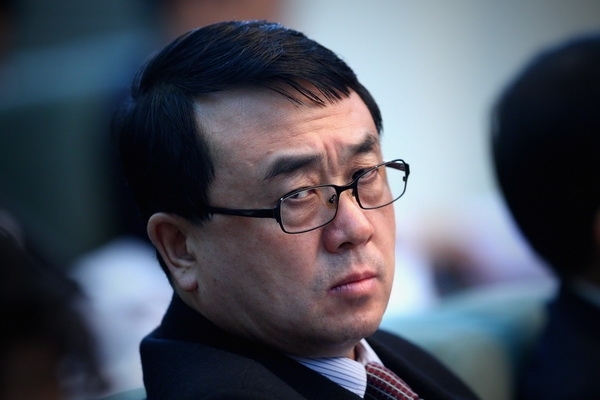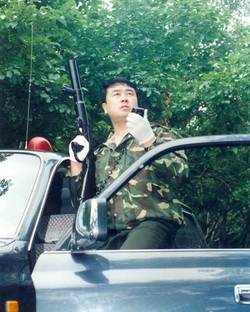


By Liu Zhiming (刘志明), Chen Yong (陈勇) and Zhang Xiaohui (张晓晖)
Nation, page 9
Issue 556, Feb 13, 2012
Translated by Song Chunling
Original article: [Chinese]
Wang Lijun (王立军), the deputy mayor of Chongqing and former head of the city's Public Security Bureau, who made a name for himself on the back of the city's famous crackdown on criminal gangs, has once again become a focus of national attention.
According to Xinhua News Agency, a spokesperson for the Ministry of Foreign Affairs told a journalist on Feb. 9, that Chongqing's Deputy Mayor Wang Lijun had entered the American consulate in Chongqing on Feb 6 and left after staying there for one day. The official also said that "relevant departments are carrying out investigations into the incident."
Before this announcement was made, a number of reports related to Wang Lijun had already attracted attention.
The Information Office of the Chongqing Municipal People's Government posted a short statement to their official Weibo account on Feb 2 noting that the city's communist party committee had decided to " ... remove Wang Lijun from his position as Director and Party Secretary of the city's Public Security Bureau, he will now serve as Deputy Mayor in charge of economic affairs."
This shift to what was later revealed to be responsibility for education, science (IPR), business administration, quality and technical standards, sport and a long list of other concerns, was the first time that Wang had found himself outside the familiar territory of policing, state security, legal affairs and other related posts since 1984.
After this new appointment, Wang was spotted paying visits to the city's education commission and Chongqing Normal University on Feb 5.
However, on the morning of Feb 8, another message was posted to the Information Office of the Chongqing Municipal People's Government official Weibo account - "According to reports, due to overwork, stress and physical discomfort, Deputy Mayor Wang Lijun is receiving 'vacation-style treatment'".
"Aggressive Wang"
"I can't agree to be interviewed," screenwriter Zhou Lijun (周力军) told our journalist over the phone on Feb 9, "it's very sensitive at the moment."
In the past, Mr. Zhou wrote the screenplay for a TV series based on Wang Lijun's exploits. In the winter of 1996, Zhou had been instructed to head to the northeastern city of Tieling (铁岭) to interview Wang Lijun.
Zhou spent ten days in the city, talking with Wang, who at that time had a promising future, and was serving as the deputy head of an office in the city's public security bureau. Wang had been awarded a "National Model Worker" award, was honored as one of the top ten policemen in the country and was also a delegate to the Communist Party's 14th National Congress.
Zhou, who also returned to the city many times in subsequent years, wrote in a blog post on Feb 8 that "my life path has allowed me to get to know Wang Lijun, and today I still count him as a friend."
Recalling the first time he met Wang, Zhou said "the room appeared smaller when Wang entered, not only because of his imposing figure, but also because of his charisma."
On the first night that he arrived in Tieling, Zhou rode with Wang in his "famous Mitsubishi jeep," tagging along as Wang and his colleagues conducted a raid.
According to what others have said, Wang likes guns and cars. His jeep was modified with two rows of lamps on the top, so that the locals could always tell "Chief Wang was coming."
On that evening Zhou accompanied Wang and his team on an assignment to bust "hair salons" suspected of being engaged in prostitution in the city of Tiefa (now known as Bingshan) which was under the administration of Tieling.
On their way to Tiefa that night, Wang drove very fast, Zhou had to hang on tight and Wang didn't even slow down when crossing the railway tracks. The jeep stopped in front of a small hairdressing salon, when "Wang got out of the car, rushed in and threw a youth with dyed yellow hair down to the ground without saying a word. On his order, other policemen began to search the room."
In the end it turned out to be a "relatively clean" salon. Zhou recalls that "Wang was not willing to let it go and he asked the policemen present to take the young man to the police station, saying that a man with hair like that can't be any good."
Zhou suspected that Wang might have acted the way he did because of his presence, Zhou later heard that dozens of people were arrested, including some prostitutes, but he didn't see any of them. The events of that night left a strong impression on Zhou.
"I felt that Wang Lijun really was 'a bit wild' and made a big deal out of small things, just as some people had told me before I arrived. Looking back on it now, even at that time he was a controversial figure. There have always been people who he rubbed up the wrong way."
Zhou also wrote that, "Wang used to be known as 'Aggressive Wang' (王彪子) when he worked as a policeman in northeastern China."
Once Upon A Time In Tieling
 It was in this city of Tieling (铁岭), where Wang Lijun made his career. Wang stayed there for 22 years and became famous for his campaign against criminal gangs.
It was in this city of Tieling (铁岭), where Wang Lijun made his career. Wang stayed there for 22 years and became famous for his campaign against criminal gangs.
He started out as an employee of the Tiefa city commercial bureau in 1982 and left the city in 2003 after climbing his way up the career ladder to become chief of police in Tieling.
Wang's younger brother Wang Lihui (王立辉) still lives in Tieling. He refused our request for an interview when we contacted him on Feb 9, stating that he "wasn't in town."
Zhou described how this deputy chief of police who made his reputation on cracking down on gang activity was full of contradictions.
"On the one hand, Wang will never say 'You Should Go!' but he'd always say 'Let's Go!' when leading his colleagues in busts; on the other hand, Wang liked 'dramatic' scenes and would stand on top of his car and fire shots into the air before dealing with a few low-level criminals.
"Similarly, while Wang didn't attempt to make a big name for himself in the media, he was very disappointed that I didn't use his real name in the play and novel that I wrote, he was also disappointed and that he couldn't play himself in the TV series.
"While Wang was relentless with gangsters, sometimes the evidence used to convict them appeared implausible.
"Wang would pay private visits to prisoners on death row the night before their executions, but he would also make sure that the ones he hated the most were forced to wait a little longer so that they were 'the last to be executed.'"
Wang, who is an ethnic Mongolian, was born in 1959 in Inner Mongolia. He joined the army in his early years and after working as an employee of the commercial bureau in Tiefa for one year, later becoming a policeman.
Wang gradually worked his way up through the ranks, first he was appointed police director in Xiaonan County (晓南) in Tiefa, then police director in Daming (大明), deputy chief of police in Tiefa and then deputy chief and finally chief of police in Tieling (铁岭).
Wang left Tieling in 2003, when he was transferred to Jinzhou (锦州) to serve as the chief and party head of that city's PSB.
Wang began to display his policing ability when he served in Xiaonan. According to a 73-year-old miner from the city who spoke to the EO on Feb 9, "All the miners have a deep impression of Wang. He signed his name very beautifully." The man also recalled that, "After Wang became the director, there are not so many crimes in the mining area in Xiaonan."
In Tieling, Wang Lijun is a household name. A taxi driver surnamed Zhang told the EO on Feb 9 that, "Everyone here knows him and thinks he is a good official who dares to fight against the gangsters."
However stories of Wang in Tieling are not all positive.
According to a report carried by the China Youth Daily published on Jun 8, 1999, Wang Lijun was involved in a car accident with an unemployed man called Zhang Gui (张贵) in another city in Liaoning province called Kaiyuan (开原).
The China Youth Daily report states that on Oct 14, 1998, Zhang Gui was riding in his three-wheel bike with two passengers, a pregnant woman and a child, when he was knocked down at a crossing by a white Mercedes-Benz.
After the accident an argument between the driver of the white Mercedes and Zhang erupted and the unemployed man was struck three times by the other man. Zhang was also later detained for 15 days by the police, despite only being found to be "30 percent liable" for the accident.
According to the report, the driver of the white Mercedes was Wang Lijun, who at the time, was deputy chief of police in Tieling.
The Battle for Chongqing
On the morning of Feb 7, Zhou texted a friend who worked in Chongqing's PSB, asking for news about Wang Lijun. According to the reply from his friend, Wang had simply been redeployed to a new position and everything was fine.
However, this wasn't enough to stop Zhou from worrying, "I could already feel that something big was about to happen."
After Wang Lijun was transferred from Liaoning to Chongqing in June, 2008, he had served first as the deputy party secretary and deputy chief of the PSB and then was promoted to party secretary and chief of the PSB and also deputy mayor of the city.
By Feb 2, when it was announced that he had been "transferred away from police work," Wang had already risen to the rank of Deputy Commissioner General (副总警监).
"Wang seems to be a born policeman and nobody who has met him could doubt that," a former classmate of Wang told the EO. The classmate said Wang was very strict with himself and his officers.
It has also been reported that Wang was a bit of an amateur inventor who had registered many patents.
His classmate also told the EO that this "transfer out of the police" would be a big blow for Wang, as he "really loves the job after all."
Talking about Wang's character, another classmate who studied alongside Wang in the early 1990s said that he was a bit "reckless" and "overbearing."
Some say that these characteristics caused him some trouble when he was in Tiefa, referring to an incident which involved electricity and water being cut-off to some police stations and also difficulties related to the distribution of welfare housing.
"Officials should be more tactful. He is too straightforward and serious, and therefore is likely to run into trouble."
After the "Edinburgh Shooting Case" (爱丁堡枪击案) in Chongqing on Jun 3, 2009, Wang started the campaign against criminal gangs in Chongqing, which brought him much praise but also a lot of controversy.
Media have reported that the atmosphere of internal police meetings chaired by Wang at the time was 'combative' (杀气腾腾).
Six or seven police officers were detained on the spot by members of the Chinese Armed Police Force, rather than regular cops, after their names and crimes had been read out publicly at an internal meeting.
During the crackdown on gangs, an unnamed source from the public security bureau revealed to the EO that Wang liked using grand measures when going up against the gangs. According to this source, Wang told a meeting that "We will whip up a storm with overwhelming momentum." Wang also said that he "hoped to hear gunshots in this battle against gangs, but that up until today there still haven't been any!"
When announcing the arrest of yet another senior police officer who was supposed to be leading the charge against the gangs, Wang was quoted as furiously berating officers, saying "Crackdown on gangs? How can we fight against the gangsters when you're even worse than the gangs!"
In the course of his "crackdown on gangs," Wang also totally overhauled the Chongqing police service. Starting from March 2010, almost all police officers ranked from vice section chiefs (副科级) to administrative-level (正处级) were removed and new people were recruited to fill 3,528 vacancies. This dramatic action gained national attention.
The Li Zhuang Case
It was the "Li Zhuang (李庄案) Case" and Wang Lijun's talk about the "Two Prosecutions" (双起论) that really stirred things up during his fight against the criminal gangs of Chongqing.
On Dec 12, 2009. Li Zhuang, a lawyer from Beijing Kangda Law Firm (北京康达律师事务所) was arrested by the police in Chongqing, because in acting as defense counsel for "a suspected gang leader" Gong Gangmo (龚刚模), Mr. Li had accused the Chongqing police of gaining his client's confession through torture.
Li Zhuang was then handed a two-and-a half-year prison sentence – reduced on appeal to one and a half years - on charges of falsifying evidence and inciting others to bear false witness.
Li's case became controversial and the "anti-gangster battle" in Chongqing gained a reputation for engaging in practices that went beyond ordinary legal methods.
As the chief of the police in Chongqing at that time, Wang must have known about Li's arrest.
The strong reputation that Chongqing's police force were building during the crackdown on gangs began to decline after more details surrounding the Li Zhuang case emerged.
Prosecuting Lawyers and the Media
The idea of the "Two Prosecutions" (双起论) was first mentioned in October 2010 when Wang gave a speech at a meeting of police officers in Chongqing.
As part of his presentation, Wang said that "In the future, if any newspaper attacks the reputation of the Chongqing police force or an individual police officer through the misrepresentation of fact, the public security bureau will sue both the newspaper that published the story and the author of the piece. If a policeman or individual is mentioned and the reports cause this individual to suffer, the police station should support and assist the police officer in launching legal action against the journalist assuming that the officer has proof to support his case. This is what we call the 'two prosecutions' - the public security apparatus sues newspapers and police officers sue journalists."
The original speech caused quite a stir, but in order to take on the controversy directly, Wang raised the topic of the "Two Prosecutions" again during the annual meeting of China's top government bodies in March 2011. As a deputy to the NPC, Wang said, "this is a rational defense of their rights, which is aimed at changing the former practice of police relying on public authority or their administrative power to deal with the situation, now the police and media are placed on an equal footing in relation to upholding the right of both parties. This should be considered as legal progress."
During the high-profile "removal" of Wang from his policing duties, Chongqing officials came out with a public statement praising Wang, "his political views are firm, he is goal oriented and has a good grasp of the general situation, he has a strong sense of responsibility and professionalism, he sticks to his principles and is willing to take on difficult problems, he is just and strict with himself and also has a good reputation among the public." The comments did include a mention of his "only shortcoming" that "sometimes he is impetuous in his work style and he doesn't pay much attention to the way in which he criticizes others."
Compared with his time in Tieling, Wang had a lower media profile after he started working in Chongqing and he rarely accepted any interviews.
Journalists from the EO tried to call him in October, 2009 at the height of the "crackdown of criminal gangs," but Wang refused politely, noting "It's enough to be devoted to the work."
When a journalist from the EO tried to call Wang again at 6:30pm on Feb 9, Wang's mobile phone was already unable to receive calls.
Links and Sources
Economic Observer: Li Zhuang Retracts Admission of Guilt Following Reduced Sentence
China Youth Daily:《被公安局长的车撞着挨打又挨拘》
Longhoo.net: 编剧周力军:发表了博文 《王立军一语成箴》
Time Magazine: China\'s Dark City: Behind Chongqing\'s Crime Crackdown
China Media Project: Wang Lijun in China\'s news pages

